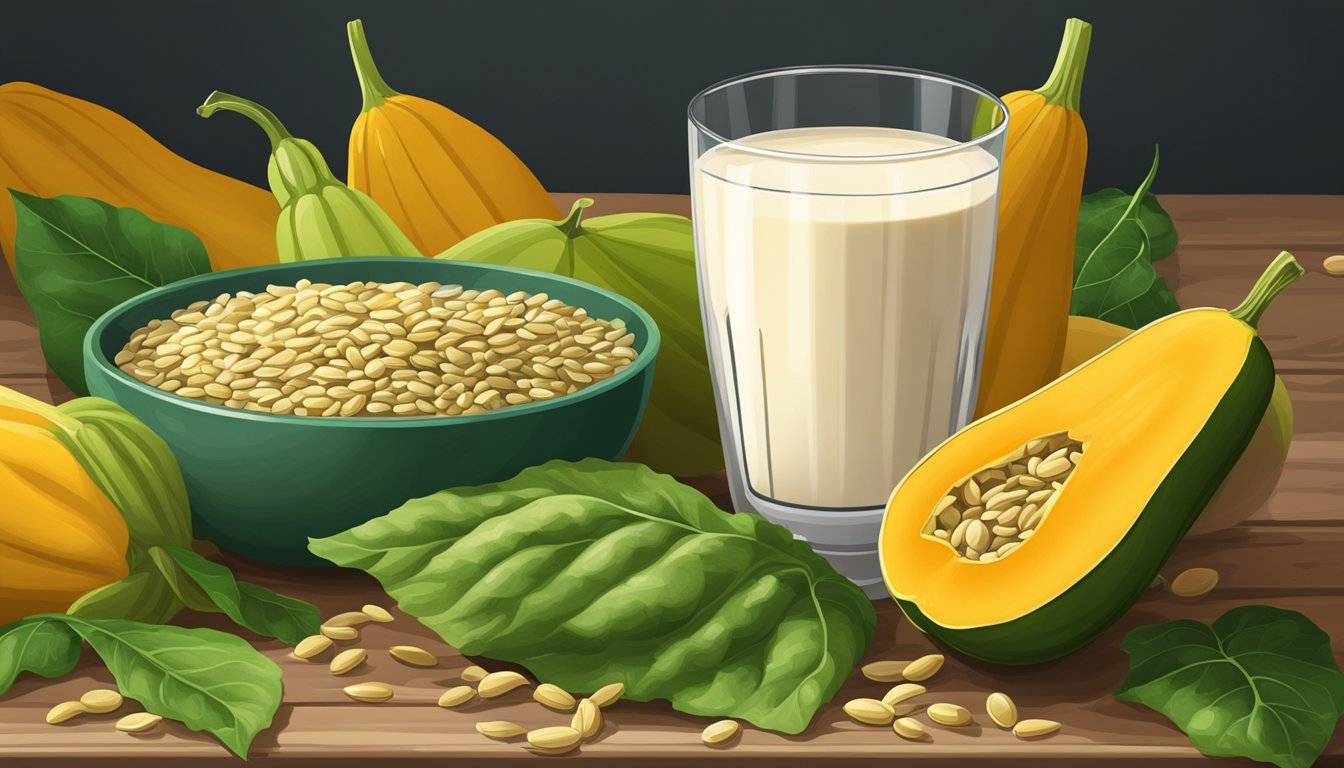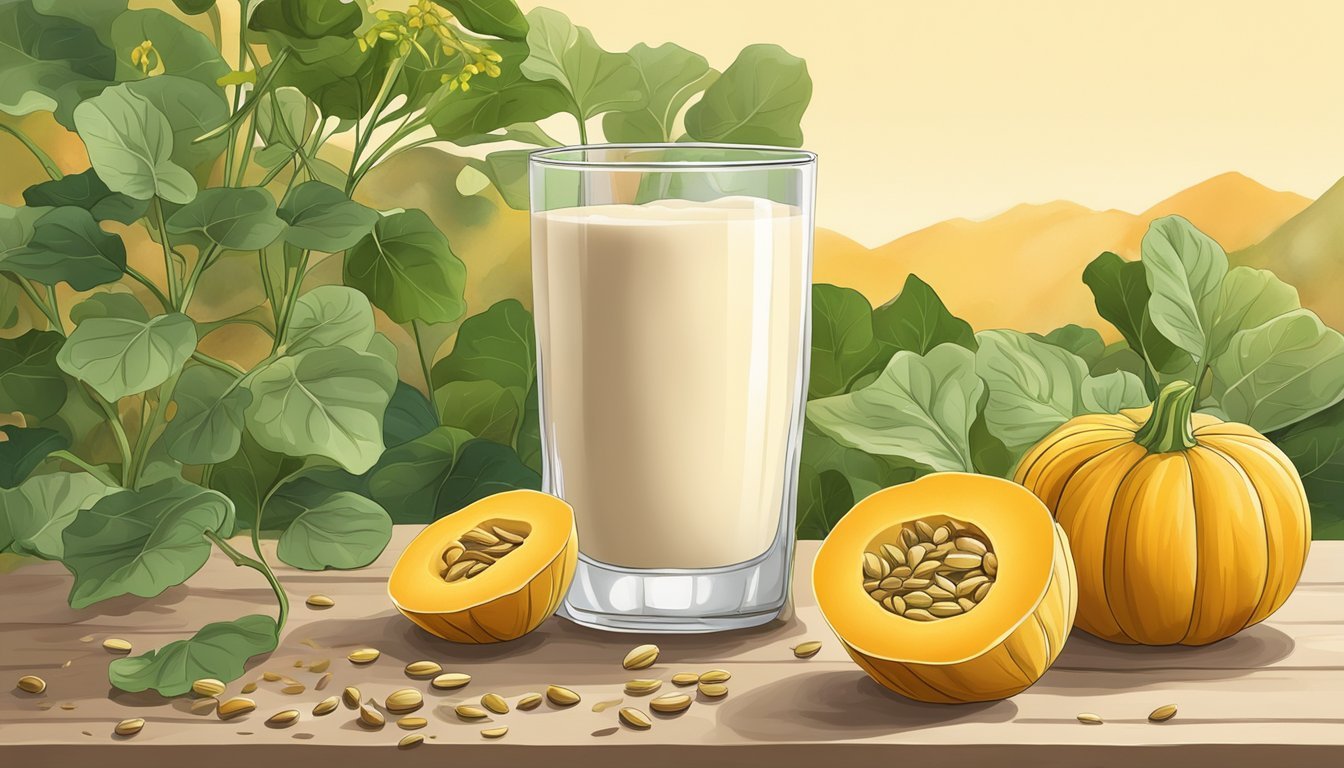Squash Seed Milk
The Nutty, Dairy-Free Alternative You Need to Try
Squash seed milk emerges as a plant-based beverage that caters to a variety of dietary needs, including those who adhere to dairy-free, nut-free, soy-free, and vegan lifestyles. It is a healthy alternative to traditional dairy products, offering a unique taste profile and a creamy consistency without the use of animal products or common allergens found in other milk alternatives like nut or soy milk. As people become increasingly mindful of the ingredients in their foods and the potential impact on their health and the environment, squash seed milk presents a sustainable and health-conscious choice.
This milk is derived from the seeds of squash, which are often discarded during food preparation. By repurposing these seeds, not only is waste minimized, but they are also transformed into a nutritious drink. Rich in Omega-3 fatty acids, squash seed milk is also typically low in carbohydrates and calories, while providing a good source of vitamins such as vitamin A, vitamin D, and vitamin B12—nutrients that are especially important for those on plant-based diets. Its neutral flavor and adaptable taste make it a versatile ingredient in a variety of recipes, from smoothies to baked goods.
Beyond its health benefits, squash seed milk is an innovative addition to the growing variety of plant-based milks, offering a unique option for those with dietary restrictions or preferences. As it gains popularity, it supports the demand for diverse and inclusive food options that align with a wide range of nutritional needs and ethical choices.
Nutritional Profile of Squash Seed Milk
Squash seed milk presents a notable nutrition spectrum, serving as a nourishing dairy-free beverage with an array of macronutrients and essential minerals. This milk alternative is particularly compelling for those seeking vegetarian, nut-free, and soy-free options.
Macronutrients and Calories
Squash seed milk is a dense source of macronutrients. In terms of calories, it's comparable to other plant-based milks. Per typical serving, it provides a balanced mix of protein and fiber, while maintaining low levels of saturated fat. The fat content mainly comprises healthy unsaturated fats.
Calories: Comparable to almond and soy milk
Protein: Moderate, plant-based source
Carbohydrates: Lower than in cow's milk
Fiber: Contributes to gut health
Fat: Primarily unsaturated, with minimal saturated fat
Vitamins and Minerals
Rich in vitamins and minerals, squash seed milk offers vitamin A, vitamin C, iron, potassium, and calcium. These nutrients support overall health and are crucial for various bodily functions.
Vitamin A: Important for vision and immune function
Vitamin C: Antioxidant that aids in tissue repair
Iron: Vital for blood production
Potassium: Helps regulate heart function
Calcium: Essential for bone health
Health Benefits
Consuming squash seed milk can contribute to a healthy lifestyle, supporting heart health due to its unsaturated fats and potentially aiding in reducing cholesterol levels. Its fiber content promotes digestive wellness, while the protein serves as a building block for the body.
Cholesterol: May help lower bad LDL levels
Healthy Fats: Supports heart health
Comparison with Other Milks
When contrasted with alternative milks like almond milk, coconut milk, and oat milk, squash seed milk stands out due to its unique nutritional benefits. It holds a middle ground in terms of protein content and is typically lower in sodium. As a dairy-free option, it lacks lactose, making it suitable for those with lactose intolerance.
Almond Milk: Less protein than squash seed milk
Coconut Milk: Higher in saturated fat
Oat Milk: Higher in carbohydrates and calories
Making Squash Seed Milk at Home
Creating squash seed milk at home is a simple and rewarding process. This non-dairy beverage offers a nutty flavor and can serve as a versatile base for various flavor enhancements.
Required Ingredients
Squash Seeds: Typically, 1 cup of seeds,
Water: Approximately 3-4 cups for blending,
Optional Sweeteners: Such as dates or maple syrup for sweetness,
Optional Spices: Like cinnamon and ground ginger for flavor.
Equipment Needed
A Blender for pureeing the seeds and water,
A Nut Milk Bag or cheesecloth for straining,
A Large Bowl to catch the milk.
Step-by-Step Process
Soak the squash seeds in water overnight.
Rinse the seeds thoroughly.
Combine the seeds with fresh water in a blender; the ratio should be 1 cup seeds to 3-4 cups water.
Blend on high until the mixture is well liquified.
Strain the blend using a nut milk bag over a bowl to separate the milk from the pulp.
Flavor Variations and Add-ins
To enhance sweetness, incorporate dates or a touch of maple syrup. Ground spices such as cinnamon and ginger can be added for a warm, fragrant note. For a creamy consistency, consider blending in a teaspoon of nut butter or a bit of cooked and mashed butternut squash.
Storage and Shelf Life
Pour the finished squash seed milk into an airtight container and refrigerate. It should stay fresh for up to five days. Shake well before each use as natural separation may occur.
Recipe Ideas Using Squash Seed Milk
Squash seed milk is a nutritious addition to various recipes, offering a creamy texture with a nutty flavor. Its versatility allows it to be used across a spectrum of dishes, from breakfast to desserts, providing an excellent dairy-free alternative that's rich in fiber.
Breakfast Options
For a satisfying start to the day, squash seed milk can be the base for smoothies or oatmeal. By blending it with bananas and a dash of cinnamon, one can create a smoothie that is not only hearty but also naturally sweet. Alternatively, cooking oatmeal with squash seed milk instead of water or other alternative milks adds creaminess and a boost of nutrients. It pairs well with vanilla and a sprinkle of sugar or a drizzle of maple syrup.
Savory Cooking Uses
In savory dishes, squash seed milk provides a dairy-free option to create creamy textures without compromising on taste. It can be used to thicken soups or sauces. By incorporating it into vegetable broth, chefs can enhance their soup base, adding depth with a slight nuttiness. A pinch of salt can be added to balance the flavors. Squash seed milk is also excellent for making dairy-free risotto or mashed vegetables, providing a creamy consistency without dairy.
Desserts and Sweet Treats
The nutty profile of squash seed milk complements sweet ingredients, making it perfect for desserts. When making pudding or mousse, it acts as a creamy component, easily blending with flavors like vanilla and cinnamon. For baking, one can substitute dairy milk with squash seed milk in recipes for cakes or muffins, which results in a moist texture with fiber content. Yogurt made from squash seed milk can be sweetened with fruits or a bit of sugar for a dairy-free dessert full of gut-friendly probiotics.
Squash Seed Milk in Special Diets
Squash seed milk emerges as a valuable addition to special diets, providing a dairy-free alternative rich in nutrients without compromising on taste.
Vegan and Vegetarian Considerations
Squash seed milk offers a plant-based milk alternative that aligns with vegan and vegetarian lifestyles. It is completely dairy-free, void of any animal products, and can serve as a nutritious source of protein for those on plant-based diets.
Allergy-Friendly Aspects
For individuals with food sensitivities, squash seed milk is a safe choice as it is inherently nut-free, soy-free, and egg-free. Its allergen-friendly profile makes it a versatile ingredient in various dietary plans, particularly for those seeking alternatives to common allergens like nuts and soy. This milk alternative also contains no cholesterol, catering to individuals who monitor their cholesterol intake for health reasons.
Weight Management and Low-Carb Diets
Those monitoring their weight or adhering to low-carbohydrate diets may find squash seed milk beneficial due to its lower calorie and carbohydrate content compared to some nut-based milks. Furthermore, it typically has a lower saturated fat content, making it a heart-healthy option for individuals aiming to manage their fat intake.
Environmental and Economic Impact
Squash seed milk presents a unique alternative in the array of dairy-free beverages, with specific implications on both the environment and the economy.
Sustainability of Squash Seed Milk Production
Squash seed milk production is characterized by a low environmental footprint, especially when compared to traditional dairy milk. Squash plants can be grown in a variety of climates, and their seeds, often a byproduct of the squash harvest, are utilized to create this nutty beverage. This not only reduces waste but also maximizes the use of available resources. The process of producing squash seed milk involves minimal water usage and lower greenhouse gas emissions, as squash plants do not require the same level of inputs as dairy farms.
Economically, the market for squash seed milk benefits from the growing vegan trend. As consumers increasingly seek plant-based options, the demand for innovative and sustainable plant milks rises. Squash seed milk can tap into this market, potentially creating new economic opportunities for farmers and producers. However, as a niche product, it faces challenges such as scale, distribution, and consumer awareness which can affect its economic viability compared to established plant-based alternatives.
Challenges and Considerations
Squash seed milk is an emerging member of the dairy-free beverage market. One must consider its specific challenges related to its production and distribution.
Availability and Accessibility
Squash seed milk, whilst a nutritious alternative to traditional dairy and other plant-based milks, is not widely available. This is due to several factors:
Limited Production: Squash seed milk is not produced on a scale comparable to almond, soy, or oat milk. This limited production affects its availability in mainstream markets.
Specialized Retailers: Consumers may find squash seed milk mostly in specialized health food stores or through online retailers, which can limit its accessibility to a broader audience.
Consumer Awareness: The general public may not be as familiar with squash seed milk as they are with other alternative milks, leading to lower demand and, consequently, less incentive for retailers to stock it.
Geographical Constraints: The growth and harvest of squash are subject to geographical and climatic conditions, which can affect the availability of seeds for milk production and impact its price and accessibility.
Future of Dairy-Free Beverages
The dairy-free beverage industry continues to grow with evolving market trends and shifting consumer preferences. This section explores the trajectory of dairy-free alternatives and their place in contemporary diets.
Market Trends and Consumer Preferences
The market for dairy-free beverages is rapidly expanding as consumer demand for plant-based, vegan, and healthier options escalates. Statistics reveal that the dairy alternatives market in the United States alone is a multi-billion dollar industry with a projected growth rate of nearly 10% by the end of 2023. Squash seed milk joins this burgeoning category by offering a unique nutty flavor without the use of traditional nuts, meeting the needs of consumers with nut allergies.
Health-conscious consumers are continually searching for beverages that contribute to their well-being without compromising taste. Squash seed milk, along with other alternative milks, is positioned to satisfy this demand with its nutrient-rich profile.
The vegan population is another driver of the dairy-free trend, as ethical and environmental concerns lead them to seek out plant-based milk options. Products like squash seed milk cater to this demographic while also providing new options for the culinary industry.
Sustainability concerns are shaping the industry as well. Alternative milks that require fewer resources to produce, like squash seed milk, are attracting attention from environmentally minded consumers.
Consumers' increasing inclination towards unique flavors, coupled with their health and environmental consciousness, suggests a promising future for dairy-free beverages such as squash seed milk. The industry's innovation is reflective of these trends, introducing a diverse array of plant-based milks that match the creaminess and taste of their dairy counterparts.







